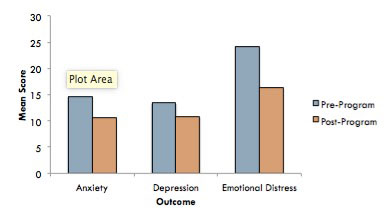Session Information
Date: Tuesday, November 12, 2019
Title: RA – Diagnosis, Manifestations, & Outcomes Poster III: Comorbidities
Session Type: Poster Session (Tuesday)
Session Time: 9:00AM-11:00AM
Background/Purpose: Background: Anxiety and depression are common in people with rheumatoid arthritis (RA). These comorbidities are associated with worse disease outcomes including pain and functional disability. Thus, treating mental health comorbidity is an important component of RA care. Given access to clinical mental health resources are limited, we evaluated the potential benefit of an online mental health intervention (i.e., self-directed cognitive behavioral therapy/CBT) for reducing mental health symptoms and improving quality of life in individuals with RA.
Methods: Methods: RA participants with self-reported clinically significant anxiety (n=38, 89% female) were enrolled. Participants completed The Worry and Sadness program, a validated, 6-module course including psychoeducation and strategies for self-management developed by an Australian research group. The program was completed, at home, over 12 weeks. Mental health outcomes were assessed using the Patient-Reported Outcomes Measurement Information System (PROMIS) scales for anxiety and depression, the Kessler Psychological Distress Scale (K-10) for emotional distress, and the PROMIS scale for physical-health related quality of life. Arthritis outcomes were assessed with the modified health assessment questionnaire (mHAQ) for physical function, PROMIS scales for pain and fatigue, and a patient-reported verbal assessment for disease activity. Measures obtained before and after completing the program were compared using paired Student t-tests. Participants also rated the usefulness of the program.
Results: Results: Participants who have completed the program (n=23) were predominantly female (mean age=59.4 years, standard deviation/SD=11.36). Immediately after completing the program, anxiety (mean difference pre-program versus post-program=4.13, SD=3.53, t(22)=5.61, p< 0.001), depression (mean difference pre-program versus post-program=2.57, SD=2.71, t(22)=4.54, p< 0.001), and emotional distress (mean difference pre-program versus post-program=7.81, SD=7.15, t(20)=5.01, p< 0.001) scores were all significantly reduced (Figure). Quality of life was unchanged, as were arthritis outcomes. Components of the program endorsed as useful to participants included identifying problematic thoughts, whereas reducing behavioural avoidance was considered less helpful.
Conclusion: Conclusions: Mental health symptoms experienced by RA patients improved after completing the Worry and Sadness online program, however, the program might benefit from adaptation to meet the needs of persons living with RA. Online tools are one feasible strategy to address the mental health needs of persons with RA, particularly in regions with limited clinical mental services.
To cite this abstract in AMA style:
Blaney C, Hitchon C, Marrie R, Mackenzie C, Holens P, El-Gabalawy R. Improved Anxiety, Depression, and Emotional Distress for Rheumatoid Arthritis Patients Following the Completion of an Online Mental Health Intervention [abstract]. Arthritis Rheumatol. 2019; 71 (suppl 10). https://acrabstracts.org/abstract/improved-anxiety-depression-and-emotional-distress-for-rheumatoid-arthritis-patients-following-the-completion-of-an-online-mental-health-intervention/. Accessed .« Back to 2019 ACR/ARP Annual Meeting
ACR Meeting Abstracts - https://acrabstracts.org/abstract/improved-anxiety-depression-and-emotional-distress-for-rheumatoid-arthritis-patients-following-the-completion-of-an-online-mental-health-intervention/

